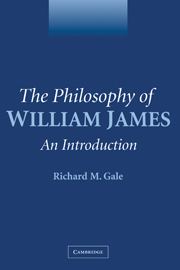Book contents
- Frontmatter
- Contents
- Preface
- Introduction
- PART I THE PROMETHEAN PRAGMATIST
- 1 The Ethics of Prometheanism
- 2 The Willfulness of Belief
- 3 The Freedom of Belief
- 4 The Will to Believe
- 5 The Ethics of Truth
- 6 The Semantics of “Truth”
- 7 Ontological Relativism: William James Meets Poo-bah
- PART II THE PASSIVE MYSTIC
- Bibliography of Works Cited
- Suggested Further Readings
- Index
7 - Ontological Relativism: William James Meets Poo-bah
Published online by Cambridge University Press: 06 January 2010
- Frontmatter
- Contents
- Preface
- Introduction
- PART I THE PROMETHEAN PRAGMATIST
- 1 The Ethics of Prometheanism
- 2 The Willfulness of Belief
- 3 The Freedom of Belief
- 4 The Will to Believe
- 5 The Ethics of Truth
- 6 The Semantics of “Truth”
- 7 Ontological Relativism: William James Meets Poo-bah
- PART II THE PASSIVE MYSTIC
- Bibliography of Works Cited
- Suggested Further Readings
- Index
Summary
The promethean James is engaged in the grand quest to have it all, which requires having each of his many selves fully realize itself. But among James's desires is a second-order desire that all of these first-order desires be realized in a harmonious way. He wants to be able, for example, to do science, lead the morally strenuous life, and be religious with a clear metaphysical conscience because there is no inconsistency between these different ways of being in and viewing the world. But there appear to be conflicts between them, and pragmatism is recommended as a reconciler or mediator, but not synthesizer or unifier, between these different selves or perspectives. Consider our “tough- and tender-hearted” selves. The former, of whom the prime example is the absolute idealist, is “rationalistic, intellectualistic, idealistic, optimistic, religious, free-willist, monistic, and dogmatical,” while the latter is of a reductive scientistic bent, being “empirical, sensationalistic, materialistic, pessimistic, irreligious, fatalistic, pluralist, and sceptical” (P 13). Most of us have a hankering for the good things in both the tough- and tender-minded ways of taking the world, in spite of their apparent clashes, and pragmatism is advertised as giving us a way to have both without there being any clashes between them.
Methodological Univocalism
The gospel preached by pragmatism is reconciliation through methodological univocalism. It shows that the tough- and tender-minded selves employ the very same method for determining meaning and truth.
- Type
- Chapter
- Information
- The Philosophy of William JamesAn Introduction, pp. 132 - 156Publisher: Cambridge University PressPrint publication year: 2004

